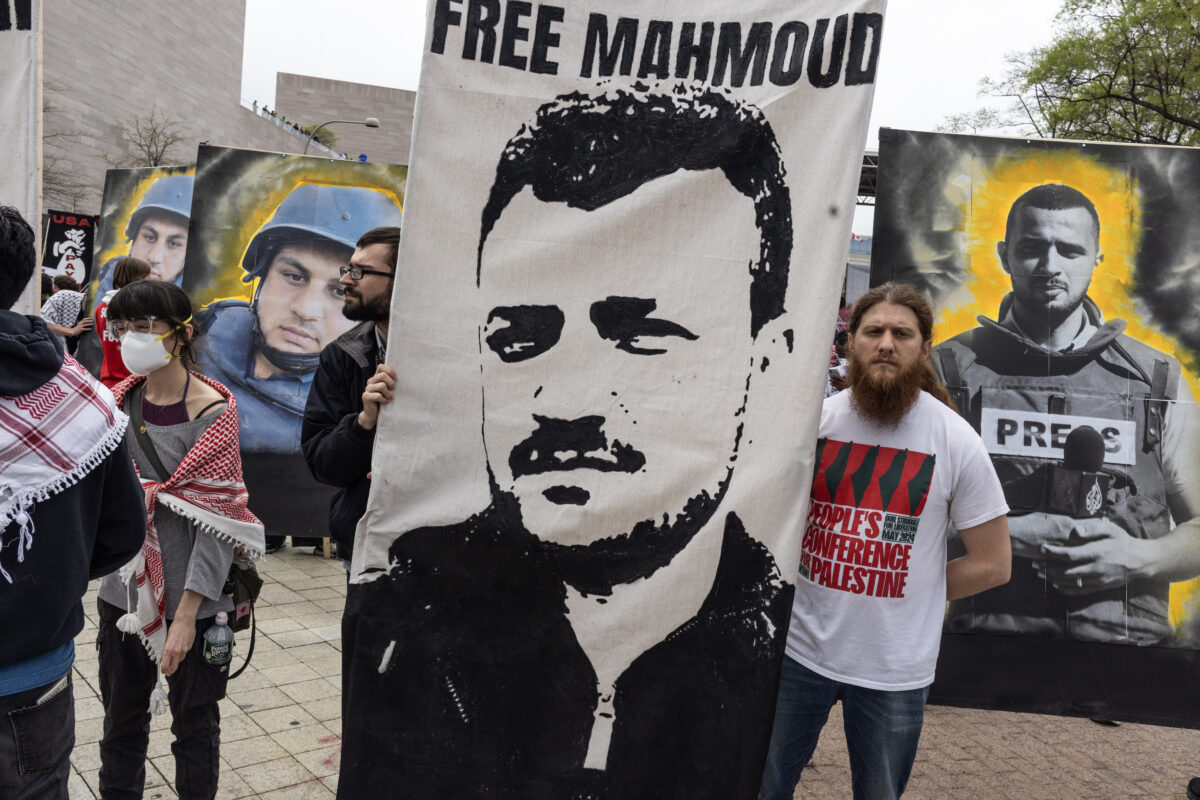Daily Kickoff
Good Friday morning.
In today’s Daily Kickoff, we preview this weekend’s nuclear talks with Iran in Oman, and talk to lawmakers wary of allowing Turkey back into the F-35 program. We also spotlight a new book about the first White House Seder, and report on a new documentary about the Yeshiva University men’s basketball team in the wake of the Oct. 7 attacks. Also in today’s Daily Kickoff: Sen. Michael Bennet, Sam Bregman and Yehuda Kaploun.
For less-distracted reading over the weekend, browse this week’s edition of The Weekly Print, a curated print-friendly PDF featuring a selection of recent Jewish Insider and eJewishPhilanthropy stories, including: Lawmakers, national security experts skeptical of Trump’s Iran diplomacy; Daniel Hernandez pitches himself to Tucson voters — and pro-Israel backers; and National Black Empowerment Council connects Black students to Israeli universities. Print the latest edition here.
Ed. note: The next Daily Kickoff will arrive on Wednesday, April 16, in observance of Passover. Chag sameach!
What We’re Watching
- Passover begins tomorrow night at sundown.
- Sen. Michael Bennet (D-CO) is expected to announce his bid for governor of Colorado today. Bennet is running for the seat being vacated by term-limited Gov. Jared Polis and joins a field that includes Attorney General Phil Weiser.
- An immigration court in Louisiana will determine today whether to continue the detainment of Mahmoud Khalil, the Columbia graduate detained after his green card was revoked over his involvement in the school’s anti-Israel protests last year. More below.
- On Monday, former Deputy National Security Advisor Dina Powell McCormick will appear alongside former Facebook/Meta COO Sheryl Sandberg at a bipartisan event at Stanford University promoting McCormick’s new book, Who Believed in You: How Purposeful Mentorship Changes the World.
- Yale University’s Poynter Fellowship in Journalism will host a trio of conservative voices in journalism and law on Tuesday for a panel discussion on the rise of distrust from the political right of higher education and the news media. The event will feature Robert Shipley, a free speech lawyer and the executive director of the Foundation for Individual Rights in Education; Jonah Goldberg, a conservative commentator and The Dispatch’s editor-in-chief and co-founder; and Aaron Sibarium, a reporter for the Washington Free Beacon covering law and higher education.
- On Tuesday afternoon, the Jewish Institute for National Security of America is hosting a virtual event with former Israeli Ambassador to the U.S. Michael Herzog.
What You Should Know
Nearly a decade after the Joint Comprehensive Plan of Action was inked between Iran and a group of Western nations, including the U.S., high-level negotiators — including White House Middle East envoy Steve Witkoff — are again preparing to engage in talks over Iran’s nuclear program, Jewish Insider Executive Editor Melissa Weiss writes.
But less than 24 hours before negotiations between the U.S. and Iran are set to begin in Oman, the parties have yet to agree on the format of the talks, underscoring the chasm between Washington and Tehran that could challenge even the best negotiators. Oman also served as a secret meeting ground for American and Iranian negotiators, including then-Deputy Secretary of State Bill Burns and Jake Sullivan, who was then-Vice President Joe Biden’s national security advisor, in the lead-up to the 2015 JCPOA.
As recently as last night, Secretary of State Marco Rubio said that the talks would be direct, while Tehran is insisting that negotiations will be conducted through Omani mediators.
Witkoff, the White House’s go-anywhere, do-anything guy, has logged thousands of miles between the Middle East and Russia, as a key cog in the Trump administration’s most high-profile diplomatic efforts: Israel-Hamas ceasefire talks, Russia-Ukraine negotiations and the freeing of American detainees, and now, taking steps toward a new nuclear agreement with Tehran. President Donald Trump has said he would like to see a deal reached within two months — and voiced support for an Israeli-led strike on Iran in the absence of an agreement.
The U.S. team has had just over a month to prepare for the talks, following Trump’s message to Iranian Supreme Leader Ayatollah Ali Khamenei in early March threatening military action in the absence of nuclear talks.
But Witkoff is a real estate lawyer and property developer, with no background in nuclear technology. He’ll be dealing — indirectly or directly — with Iran’s lead negotiator, Foreign Minister Abbas Araghchi, who also served as Iran’s chief negotiator a decade ago, when Tehran negotiated the JCPOA with the Obama administration — a deal that Trump withdrew the U.S. from in 2018.
Much has changed since 2015: Iran’s formerly robust and threatening proxy network has been crippled, the Iranian nuclear program has advanced well beyond where it stood when the JCPOA was signed and Iran has deepened its alliances with Moscow and Beijing.
Tehran is also facing an emboldened Trump who is looking to score his first major diplomatic win of his second term — as well as an Israel that has demonstrated over the last year it is unafraid to strike targets deep in the heart of the Islamic Republic. U.S. intelligence suggested that Israel is likely to strike Iran this year, heightening pressure on the U.S. to reach a deal, though it’s hard to imagine a nuclear agreement between the U.S. and Iran that the Israelis would be happy with (despite Israeli Prime Minister Benjamin Netanyahu publicly backing the talks).
The core challenge facing negotiators is that the Israeli and Iranian objectives for these talks are fundamentally at odds: Israel, and some members of the Trump administration, want the full dismantlement of the Iranian nuclear program, while Iran wants its program to continue. How the American negotiators in Muscat, led by Witkoff, will bridge that divide remains to be seen. But before they can do so, they’ll need to come to their first agreement with Iran: how to hold the talks in the first place.
ANKARA ALERT
Lawmakers remain wary of Turkey’s readmission into F-35 program

Congressional lawmakers remain wary of efforts to bring Turkey back into the F-35 program, a move that is reportedly under consideration inside the Trump administration, Jewish Insider’s Marc Rod reports. President Donald Trump is said to be open to a deal to sell Turkey the advanced weapons systems if both parties reach an agreement to render the Russian S-400 air-defense system that Turkey purchased inoperable. Its acquisition of the S-400 initially caused Turkey to be booted from the F-35 program in 2019 under U.S. sanctions law.
State of play: Some on Capitol Hill emphasized that Turkey must be required to meet that basic precondition before it can be readmitted into the F-35 program. But others argue that the country, which has been an often-unreliable ally to the United States and has been increasingly aggressive toward Israel, should face higher hurdles to getting the cutting-edge system. Those opponents include Israeli Prime Minister Benjamin Netanyahu, who reportedly lobbied against providing Turkey with the system during his visit to the Oval Office this week.
Read the full story here with comments from Reps. Gus Bilirakis (R-FL), Chris Pappas (D-NH), Dina Titus (D-NV) and Sens. Tim Kaine (D-VA) and Mike Rounds (R-SD).











































